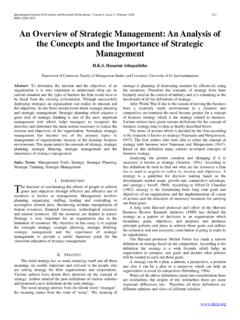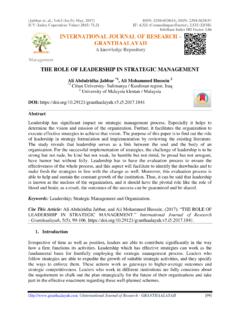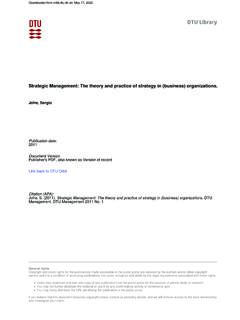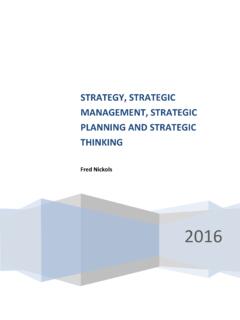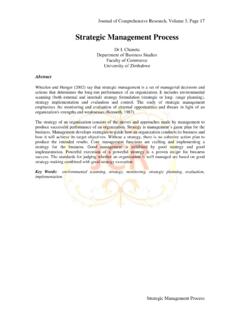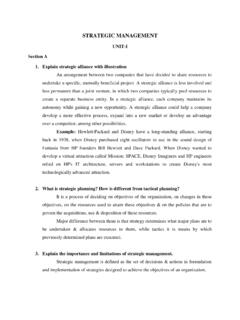Transcription of STRATEGY AND STRATEGIC MANAGEMENT CONCEPTS: …
1 EM_01_14_zlom 8:44 Str nka 43. Business Administration and MANAGEMENT STRATEGY AND STRATEGIC MANAGEMENT . CONCEPTS: ARE THEY RECOGNISED BY. MANAGEMENT STUDENTS? Emerson Wagner Mainardes, Jo o J. Ferreira, M rio L. Raposo Introduction context of organizational knowledge MANAGEMENT , specifically the knowledge that new When reviewing STRATEGIC thinking, we realize professionals bring into companies, grasping how this phenomenon has gone through different which type of STRATEGIC understanding new phases and semantic contexts. With a millen- managers bring into the organization is clearly nium distancing the word from its origins, the of importance [15], [58], [74]. Thus, we may word STRATEGY has had several meanings but question whether concepts of STRATEGY and without ever losing its semantic roots. In the STRATEGIC MANAGEMENT are understood by beginning, STRATEGY took on a military business managers, especially the younger, the significance and represented the action of newly graduated in MANAGEMENT .
2 Therefore, commanding or leading armies in times of war, this research aims to assess the acquired a military campaign [30]. It meant a way of knowledge of university MANAGEMENT students prevailing over the adversary, a tool of victory in relating to STRATEGY and STRATEGIC MANAGEMENT war and only afterwards was it applied to other concepts with the purpose of answering the contexts and fields of human relationships: following question: What is STRATEGY and political, economics, business, among others, STRATEGIC MANAGEMENT to future managers? Are but always retaining in all its uses the semantic they understood and recognized? root, to define paths [76]. To answer this question, this study seeks to After several phases and meanings, the examine MANAGEMENT student understanding concept of STRATEGY has evolved into a field of as to the meaning of these two concepts. As knowledge in MANAGEMENT , STRATEGIC mana- specific objectives, we seek : (i) to build gement, with content, concepts and practical a model explaining the definition of STRATEGY reasoning, ending up by carving out its own according to the perceptions of students role in the academic and business fields [25].
3 Graduating in MANAGEMENT , and (ii) to identify MANAGEMENT uses this old military concept to which concept of STRATEGIC MANAGEMENT in the associate the activities of a general with those existing literature comes closest to the of an organization's manager [76]. Since it perceptions of current MANAGEMENT students. represents an important tool for business To understand the perceptions of indivi- MANAGEMENT in a competitive and turbulent duals about a particular concept, we adopt marketplace, the main objective of STRATEGY phenomenography type research practices. involves preparing the organization to confront The main feature of the research method is its the current hostile environment, to this end description of a phenomenon as it is expe- systematically and objectively deploying the rienced, emphasizing the collective significance skills, qualifications and internal resources of of the studied phenomena, and should in no the enterprise [25]. On the other hand, the way be confused with phenomenological concept of STRATEGY still seems to be a very studies.
4 Phenomenology is far more concerned vague concept and subject to various with the individual experience of the people interpretations [14]. involved than with the phenomena studied [2]. An exact definition of STRATEGY may not The study is justified due to the sheer actually be fundamental, however, within the importance of the themes of STRATEGY and DOI: 1, XVII, 2014 43. EM_01_14_zlom 8:44 Str nka 44. Ekonomika a MANAGEMENT STRATEGIC MANAGEMENT to contemporary Another reason that led to this study was organizations [74]. In this sense, the survey the method adopted, phenomenography, sought to contribute towards MANAGEMENT whose main characteristic is its ability to knowledge in the organizational environment capture the perceptions of a group of people by clarifying what is the real understanding of about a concept. After an exhaustive search of MANAGEMENT graduates on the themes of available scientific databases, only one study of STRATEGY and STRATEGIC MANAGEMENT . a similar nature was found, the Shanahan and According to Tseng [83] and Obembe [60], Gerber [75] research on the concept of quality knowledge MANAGEMENT in an organization in HEIs, which proved the inspiration for the begins by identifying the knowledge that research set out here.
5 Most of the other individuals bring in from outside the company. phenomenography studies found deal with In this case, the development of organizational educational teaching methods [5], [13], [19], STRATEGY depends on understanding the [36], [63], [82] or, in fewer cases, the behaviour perceptions of their managers on what STRATEGY of consumers [88]. In the field of STRATEGY , they and STRATEGIC MANAGEMENT actually is. The both represent an innovation and a new identification of perceptions of future managers alternative for research. on the two concepts, as used in this study, The paper is structured as follows: firstly, contributes significantly to organizational mana- a literature review of the STRATEGY and STRATEGIC gement practice. This enables the organization's MANAGEMENT concepts from a historical MANAGEMENT strategies as organizational perspective is carried out. Afterwards, the knowledge on the field of STRATEGY can hardly be phenomenography research is described and managed should each manager understand the explained.
6 The methodology adopted in the concept differently. survey is presented in the next section. The study findings may also be expected to Subsequently, the collected data are analysed contribute to Higher Education Institutions and our model is tested. The article ends up (HEI), by identifying what level of understan- with final considerations and future recom- ding their graduating MANAGEMENT students mendations. attain regarding the subjects under analysis. The research contribution also extends to the 1. STRATEGY and STRATEGIC academic world by presenting the concepts of MANAGEMENT : a Historical STRATEGY and STRATEGIC MANAGEMENT most Perspective present and active in the minds of future STRATEGY was created by the Greeks, who managers, findings rarely encountered in the endowed the concept with a military conno- literature. There are few studies relating STRATEGY tation. The term derives from the Greek strategos, as a theoretical approach and its practical translated as a general in command of troops application in organizations [42], [68].
7 Thus, this or the art of the general or plan to destroy study contributes to research on STRATEGY demon- enemies through effective use of resources strating that the field of STRATEGY , comprising as [18], [76], [78]. This term in itself contained the it does of several concepts and approaches, idea of objectives to be achieved and plans of generates confusion among MANAGEMENT action to be performed in various scenarios, practitioners. After all, the same phenomenon depending on the enemy's behaviour [73]. is approached in several distinctly different According to Mintzberg and Quinn [53], ways and individuals working in MANAGEMENT STRATEGY was already considered as an orga- would also seem to hold various perspectives, nizational skill at the time of Pericles (450 BC), often understanding neither the real meaning of meaning MANAGEMENT skills (administrative, STRATEGY nor its MANAGEMENT [41], [62]. leadership, public speaking, power). However, Furthermore, this research aims to provide it was only after World War II that STRATEGY fully some insights for lecturers bearing in mind that entered into the business world, which has student opinions and knowledge on this matter since grown significantly and needed guidance, reflect the efficiency and the effectiveness of lines and paths to be followed by their entire the STRATEGY related learning process [31], structures [18].
8 This growth increased organi- potentially revealing a need to change the zational complexity and, together with the didactics of these classes. accelerated pace of environmental changes, 44 2014, XVII, 1. EM_01_14_zlom 8:44 Str nka 45. Business Administration and MANAGEMENT began requiring enterprises deploy greater the soul and existential rationale behind capacity to create and manage strategies a company's existence. It is a concept often put enabling them to meet the challenges of the forward in the academic and business worlds, market, reaching their objectives in the short, filled with a great diversity and width, which in medium and long term [25]. some aspects is complementary while According to Mintzberg [51], it was only in divergent in others [68]. the 1980s that strategies underwent great According to Fahey [28], there are few development within the corporate environment. words subject to as many abuses in its Phenomena such as corporate restructuring, utilisation in enterprises, as poorly defined in joint decisions and actions impacting on MANAGEMENT literature and exposed to such organizational size, financing and portfolios different factors as STRATEGY and hence it is [87] were driven by the technological advance a term that causes widespread discussions, in means of communication and transport and, especially among theorists.
9 Mintzberg et al. since then, an interactive dynamic and integration [54] argue that STRATEGY is the enemy of the on a global level have become predominant. deterministic and mechanistic approaches, Nowadays, thinking strategically has acquired because they minimize freedom and choice. the status of an indispensable factor in leading STRATEGY is not only one way of dealing with an and managing organizations, whether for profit adversary in a competitive environment or or otherwise [55]. After all, STRATEGY addresses market, as treated by much of the literature and the link between the inner world of business its popular use [53], as it cannot only and its external environment [68]. summarize the ideas, proposals, guidelines, Considering its importance, talking about indicative of paths and solutions [68]. STRATEGY STRATEGY opens up a discussion of theoretical instead has a breadth and scope that encircles approaches, ranging from the more conventional, the concept of operational efficiency [67] and considering STRATEGY as a business logic, cannot be confused with its tactics.
10 In other rational and sequential [21], to the most dynamic, words, STRATEGY is not something static, that understand this process as associated with finished, which renders the concept complex cultural and learning factors, politics and power and difficult to grasp [25]. relations [54]. Thus, there are two major This fact has an explanation. STRATEGY in problems affecting the understanding of what organizations, as a field of study, is much the concept of STRATEGY really means: confusion newer than its current practice [69], and its between STRATEGY and effectiveness tools and knowledge remains under construction. This confusion between STRATEGY and STRATEGIC can be perceived through analysis of the planning [27], [56], [67]. The root of the problem literature review displaying several different seems to be the lack of a full understanding as definitions of STRATEGY over time (table 1). to what STRATEGY really is. Considering the definitions listed in Table 1, along with the hundreds more available, it Definitions of STRATEGY would appear that the definition of what As can be seen, STRATEGY is historically linked to STRATEGY means is neither closed nor simple to pre-empting different scenarios and action establish a consensus on.

